Brother of Gaul trawler victim reflects on 50-year anniversary
- Published
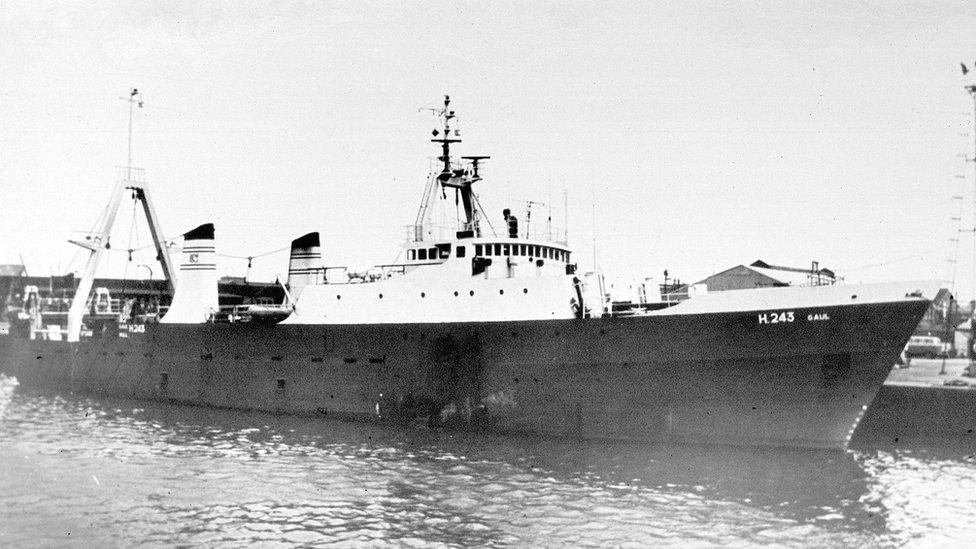
The Gaul sank in heavy seas in February 1974, with the loss of all 36 crew
The sinking of the trawler Gaul in the Barents Sea, off Norway, on 8 February 1974 claimed the lives of 30 trawlermen from Hull and six from North Shields. At the time, it was dubbed the worst ever single-trawler tragedy.
On the 50th anniversary of the tragedy, BBC News went along to what was the beating heart of Hull's fishing industry to speak with those personally affected.
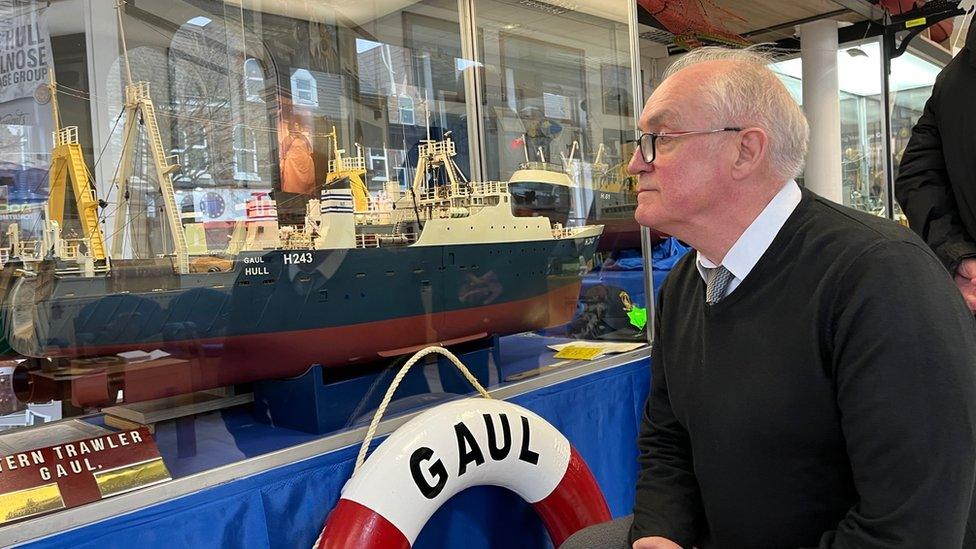
Kevin Tracey, brother of Billy Tracey who was lost on the Gaul, examines a model of the trawler which sank in February 1974
Billy Tracey, one of 36 men who would die on the Gaul, had been hell-bent on stopping his little brother following him to sea.
"I'd just left school at 15," recalls Kevin Tracey, 69. "I was going to be a galley boy on a Hull trawler.
"Our Billy, a spare hand on trawlers, came home from sea one day and saw my kitbag containing all my fishing gear that I'd stuffed behind the settee. He asked whose it was. I told him it was mine and he said I wasn't going to sea.
"Two days later, Billy was away on a [fishing] trip. I noticed my kitbag was gone. It turned out Billy had taken it."
I ask him if he felt his brother, who was 24 when he was lost on the Gaul, had been looking out for him.
He nods, adding: "I think so. He would have known how dangerous a job it was. I was the baby of our family."
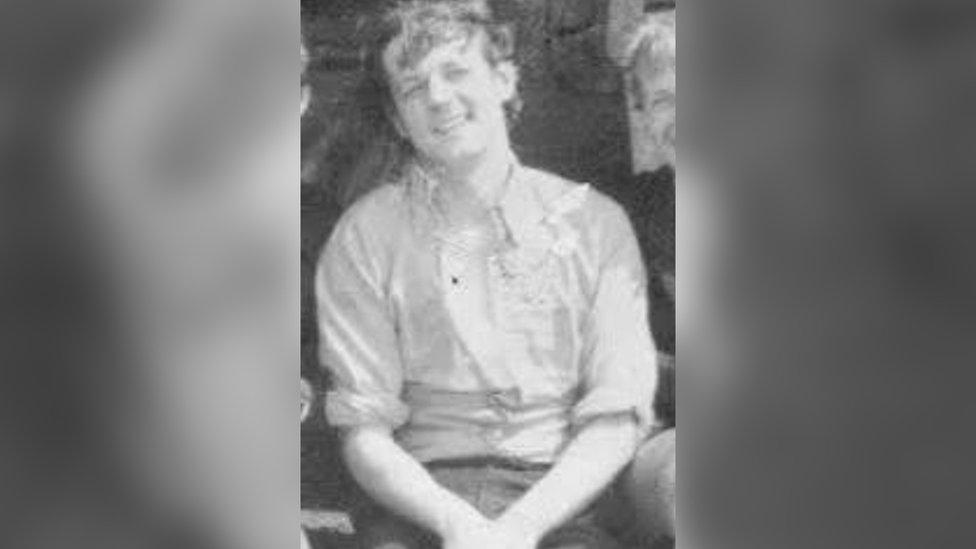
William 'Billy' Tracey was one of the 36 men lost on the Gaul
We are in the Hull Fishing Heritage Centre in Hessle Road, a street once the heart of this proud fishing community. We are surrounded by fishing memorabilia.
In a corner, Mr Tracey eyes a kitbag, identical to the one he owned.
"Maybe that's where it ended up," he says.
As a result of his brother's intervention, Mr Tracey returned to his old job fileting fish rather than catching them.
However, Billy continued working on trawlers; a job that would cost him his life.
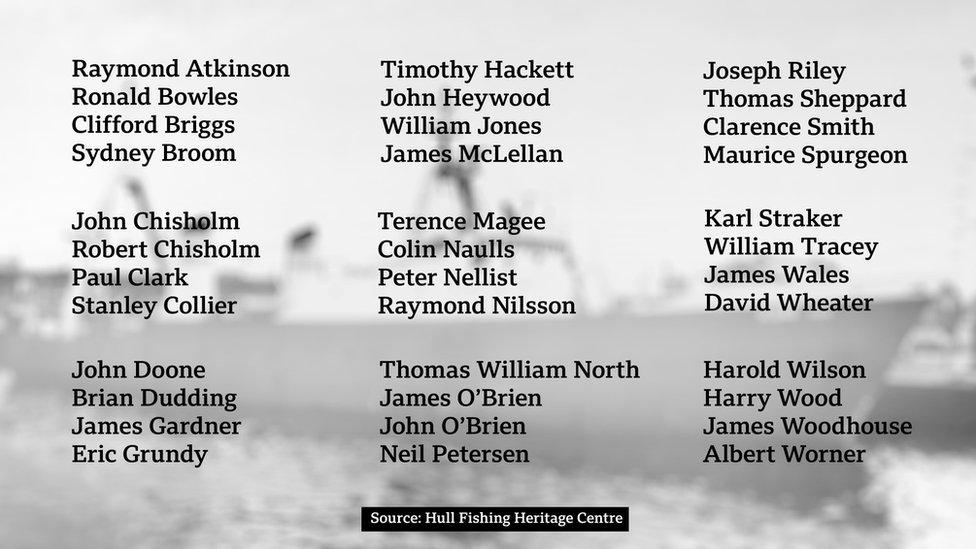
The Gaul victims
In front of us is a scale model of the Gaul. Mr Tracey inspects the miniature figures on the deck, imagining his brother dragging in the nets.
Mr Tracey can still recall the day the police came knocking on his family's door to deliver the news all fishing families dreaded.
"I was 19 years old," he says. "I opened the door to the bobby. He told us the Gaul was reported as missing."
For days, however, rumours had been circulating Hessle Road, a community as tightly woven as the nets, that the Gaul had failed to radio in, as was standard procedure.
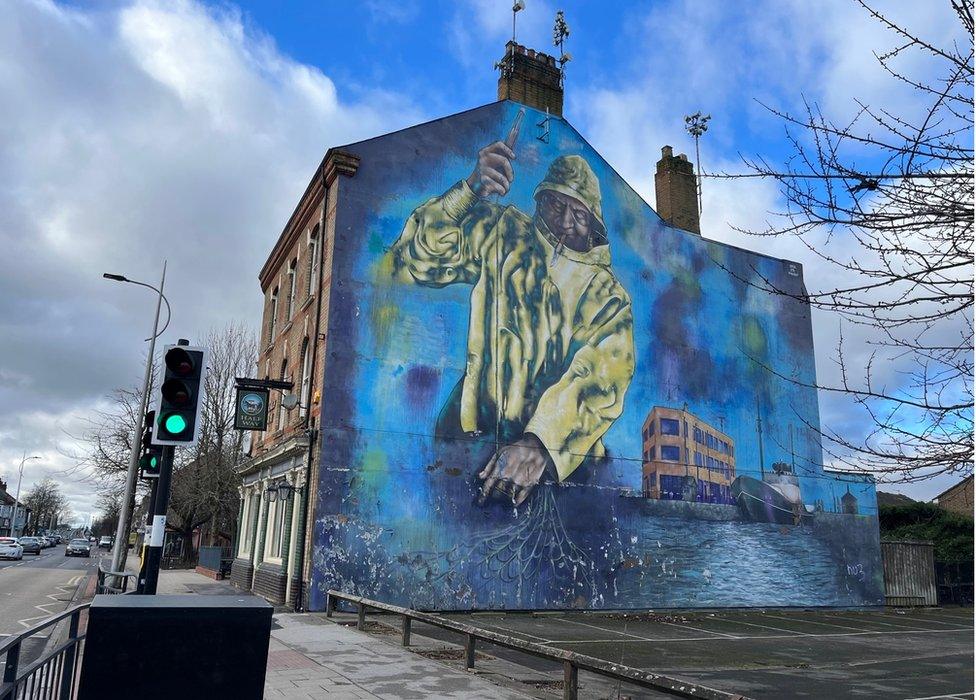
Many of Hull's trawlermen lived in and around Hessle Road, where the industry is still reflected
Fresh in the memories of many here, said Mr Tracey, was the loss of three vessels, the St Romanus, Kingston Peridot and Ross Cleveland, which sank in the space of less than a month a few years earlier in 1968.
Those sinkings, which became known as the Triple Trawler Tragedy, claimed the lives of 58 Hull men.
The aircraft carrier HMS Hermes, four other British ships, three Norwegian ones and 19 trawlers searched for the Gaul but failed to find it - or any trace of the crew who ranged in age from 17 to 59.
In 1974, a formal investigation into the sinking concluded "that Gaul capsized and foundered due to being overwhelmed by a succession of heavy seas".
However, rumours circulated suggesting Gaul had been carrying out spying missions and been seized by Russia. Another theory was that it had been accidentally sunk by a Nato submarine.
Wreckage of the vessel was not discovered until 1997 after which Deputy Prime Minister and Hull MP John Prescott ordered surveys.
An inquiry in 2004, external concluded the Gaul sank because its hold became flooded during a violent storm.
Mr Tracey said he has never believed the Cold War conspiracy theories.
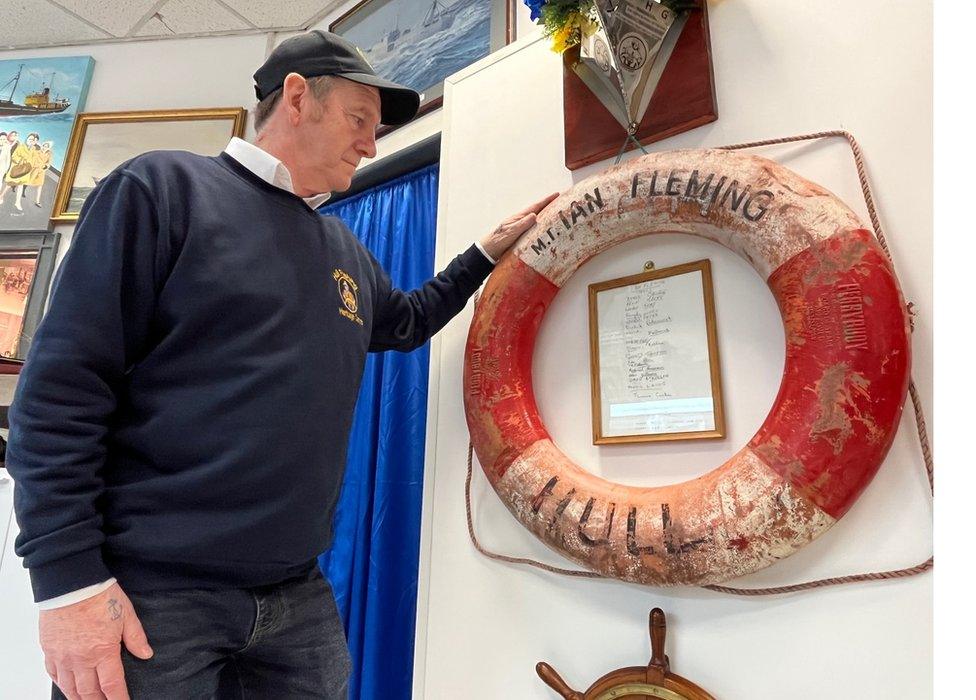
Jerry Thompson, a former trawlerman, narrowly survived the sinking of the Hull trawler Ian Fleming a few months before the Gaul was lost
Jerry Thompson, 67, a former trawlerman and the centre's chairman, was close friends with Karl Straker, 17, a trainee cook on the Gaul.
"I'd gone to a nightclub called Scamps in town and I'd seen Karl's girlfriend crying, being consoled by a friend," recalls Karl.
"She told me Karl was on the Gaul. I remember screaming, 'No. Please no. Don't say that'. I'm not afraid to admit it - I also started crying."
A few months earlier Mr Thompson had survived his own sinking when the Ian Fleming trawler sank, also off Norway, with the loss of three men.
"When I arrived home, my parents held a party for me," says Mr Thompson. "I can still remember Karl greeting me. Everybody knew Karl. He was a thoroughly good lad."
Sally Taylor, from The Fishermen's Mission, external, an organisation that provides practical, emotional and financial help to trawlermen and their families, says the loss of the Gaul is still felt in Hull and North Shields.
She tells me: "Still to this day, people are dealing with the loss. The 50-year anniversary brings memories back."
In front of the heritage centre is a plaque to the victims, allowing their loved ones to quietly reflect on the loss.
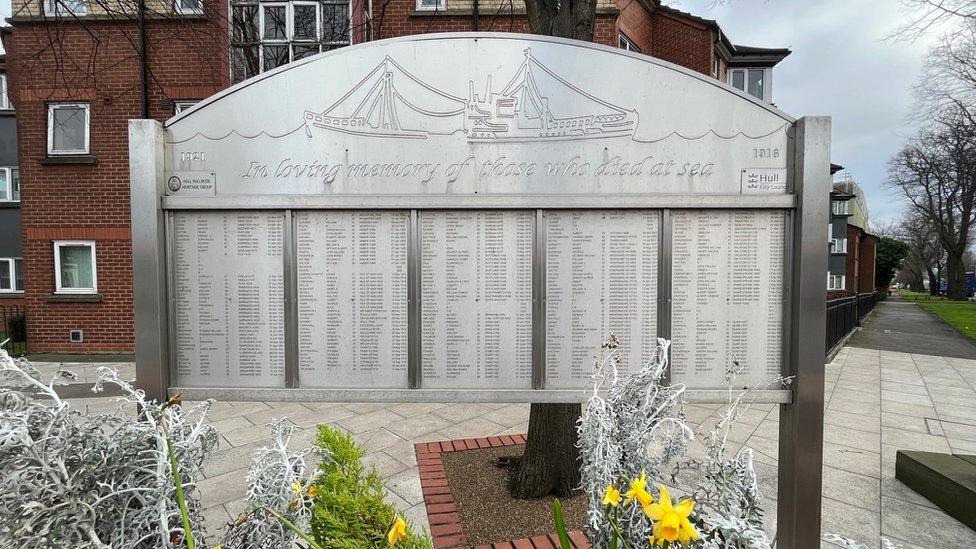
One of several boards in Hessle Road, Hull, displaying the names of the thousands of trawlermen lost at sea
Mr Tracey often feels drawn there.
He adds: "I like to take five minutes. I can almost see the trawlermen, smartly dressed in their collar and ties, walking along the road to the pubs.
"On this anniversary, I'll be thinking of Billy and the others. I'm proud."

Follow BBC East Yorkshire and Lincolnshire on Facebook, external, X (formerly Twitter), external, and Instagram, external. Send your story ideas to eastyorkslincs.news@bbc.co.uk, external.
Related topics
- Published17 January 2024

- Published10 November 2023
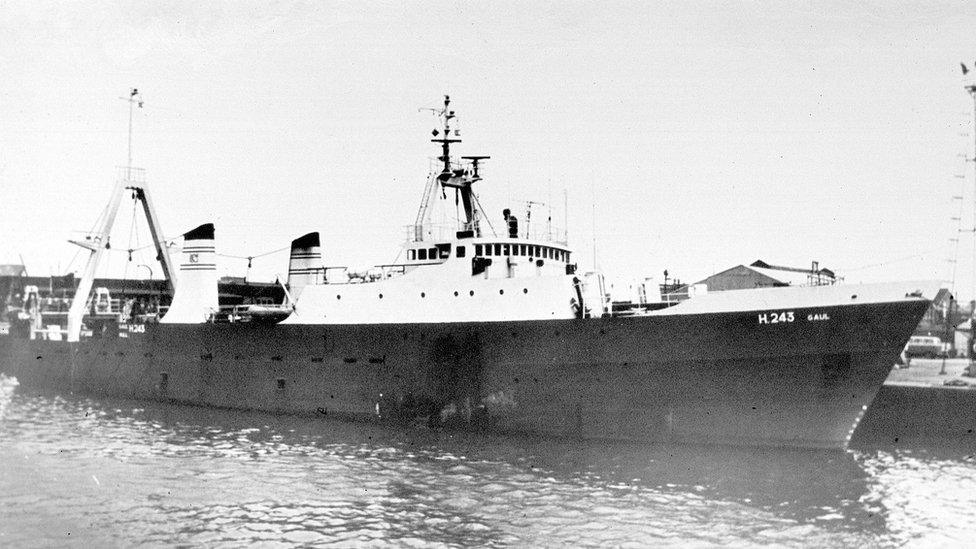
- Published11 January 2023
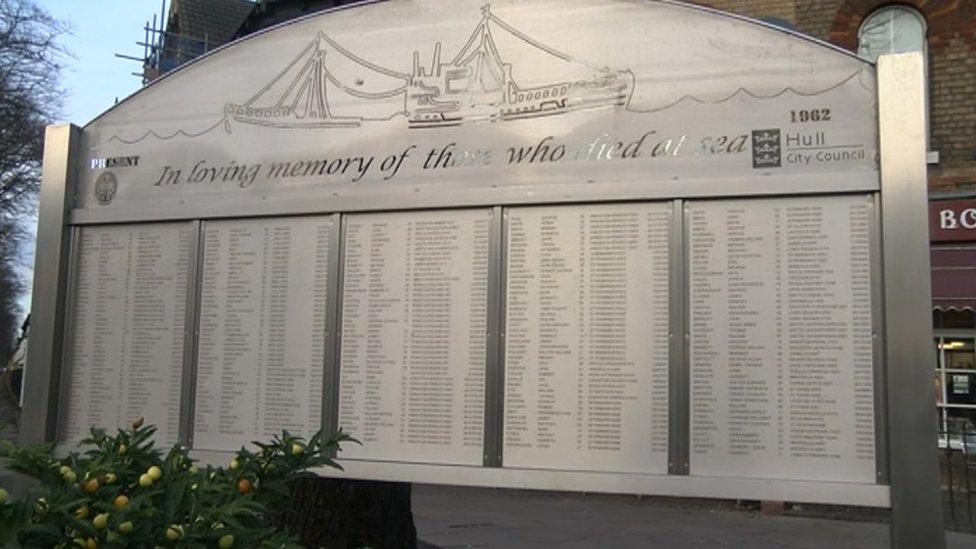
- Published11 October 2016
